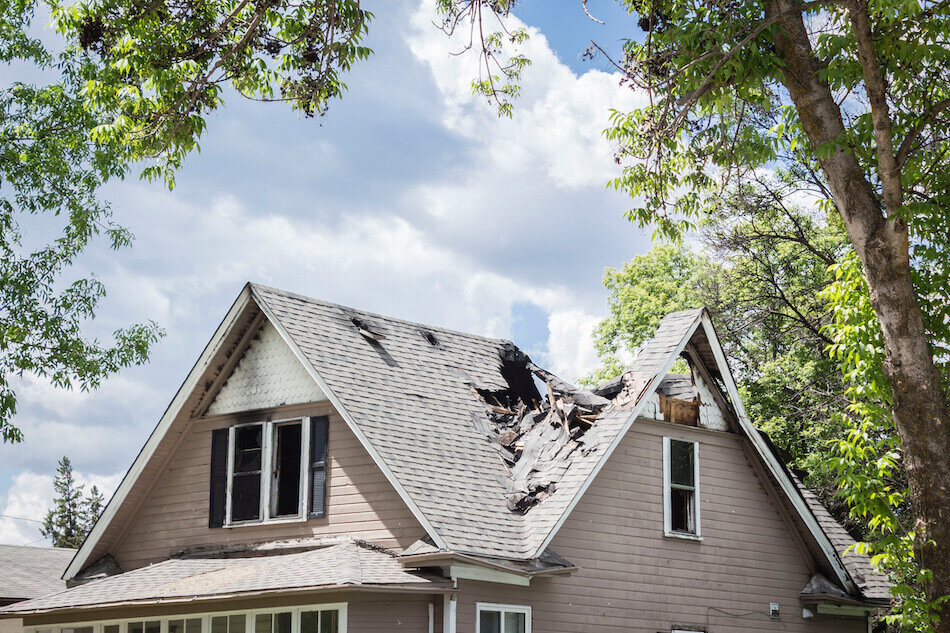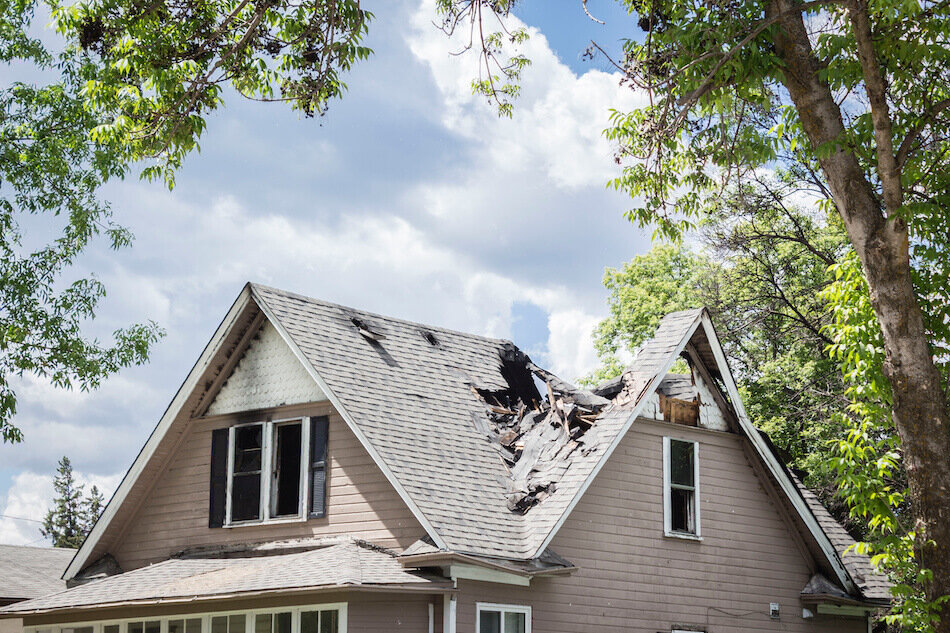 Selling a house with fire damage is difficult—but it is possible. For a successful sale, it’s important to understand the complexities involved in selling your home after a fire, including the magnitude and impact of damage, the minds of potential buyers, and the value (or lack thereof) of repairs. If you have a house with fire damage that you need to sell—or you simply want to learn about your options outside of repairing the house yourself—familiarizing yourself with the avenues available to you will pay off in spades.
Selling a house with fire damage is difficult—but it is possible. For a successful sale, it’s important to understand the complexities involved in selling your home after a fire, including the magnitude and impact of damage, the minds of potential buyers, and the value (or lack thereof) of repairs. If you have a house with fire damage that you need to sell—or you simply want to learn about your options outside of repairing the house yourself—familiarizing yourself with the avenues available to you will pay off in spades.
For informational purposes only. Always consult with a licensed real estate professional before proceeding with any real estate transaction.
Get a Cash Offer on Your Home With Cash Is King.
Want to skip the hassle of selling your home? We’ll make you a Guaranteed Cash offer. Get started now for free!
Key Takeaways
- Immediate action is crucial for safety and insurance claims.
- Homeowners have two options: sell as-is or repair the fire damage.
- Full disclosure to potential buyers is essential for a lawful and ethical sale.
What to Do After a House Fire
Safety first. Do not enter a house after a fire until the fire department gives you the all-clear. Structural damage is common after fires and can cause injury in the aftermath. Even after being given the all-clear, use caution when checking your home after a house fire.
You’ll need to call your utility company to turn off electricity, gas, and water service—gas and electricity especially can cause further damage in the midst of a fire. The fire marshal will let you know when it’s safe to turn them on again.
Contact your insurance company immediately to start the claims process. Make sure to request a fire report from the fire marshal or fire investigator. You don’t need to assess the damage before starting the claims process; often, the insurance company expects the call as soon as the firefighters leave the scene. This won’t affect your home sale—you can sell a home with an open insurance claim.
When it’s safe to re-enter your home, thoroughly document all damages through photographs and detailed notes for insurance and future sale purposes. If you need temporary housing, contact a local disaster relief organization. Temporary housing may also be covered in your insurance policy.
Understanding the Impact of Fire Damage
As bad as your home may look after a fire, fire damage to a house extends far beyond what is immediately visible. These hidden impacts can significantly affect both the value and safety of the property, each contributing to the complexity of fire restoration.
Structural Damage: A house fire can gravely compromise the structural integrity of a home. This type of damage might not always be obvious but can pose serious safety risks. It is crucial to thoroughly assess and address any structural weaknesses caused by the fire. This might involve reinforcing the foundation, walls, or roof of the house. If the fire damage to your home is extensive enough to render it uninhabitable, tips for selling a condemned house may become relevant.
Smoke Damage: The impact of smoke extends beyond visible soot or charring. It can permeate various materials in the house, especially porous materials such as carpets, upholstery, and even paint, leaving behind a persistent odor and potentially hazardous compounds. An air freshener won’t cut it—professional cleaning and deodorization are essential to remove these lingering traces of smoke.
Water Damage: As odd as it may seem to worry about water damage after a fire, firefighting efforts can leave behind consequences. Selling a house with water damage can be especially tricky if it’s allowed to linger long enough to cause structural weakening. Addressing water damage promptly by drying out the property and undertaking water mitigation efforts is essential. This step not only prevents mold growth but also safeguards the house from further structural damage.
Mold Damage: Mold growth is a sneaky aftermath of fire-related water damage. The moisture introduced during firefighting can become trapped in walls, ceilings, and other hidden areas, fostering an environment where mold can thrive. This not only poses additional health risks to occupants but can also weaken structural elements of the house even further as it consumes wood and other organic material. Early intervention to mitigate water and fire damage is key to preventing mold infestation and maintaining the integrity and safety of the property.
Each of these aspects requires careful and professional attention to restore the property effectively and ensure its safety, functionality, and appeal in the real estate market. The sheer extent of mitigation required after a fire takes place makes selling a house with fire damage a daunting task, but it can be done.
Options for Selling a Fire-Damaged House
Once you’ve taken stock of the damage and decided to sell, you’ll have to decide whether or not to perform repairs first or sell it as it is.
Selling a Fire-Damaged House As-Is
There are many situations in which selling a house with fire damage as-is is the better option. These can include:
- Expensive repairs: whether you simply don’t have the money readily available or repairs would cost more than they’re worth, expense is one of the most common reasons to sell a home as-is.
- Time constraints: repairing fire damage can take months, either paying for temporary housing or living in a construction zone. All the while, you’re responsible for taxes and other property expenses.
If you’re selling a home with fire damage as-is, consider the benefits of selling your home for cash.
Traditional homebuyers are usually looking for move-in-ready homes, and even homebuyers willing to buy a fixer-upper can be turned off by the complexity of a fire remediation. Finding a willing buyer for your fire-damaged home is like trying to find a needle in a haystack, and it’s likely your listing will sit on the market for a while if you go the traditional home-selling route.
Even if you find a willing buyer, you’ll have to hope that their bank is willing to lend them the money to buy the property, or that they’re able to pay cash. While the percentage of cash buyers on the traditional market is on the rise, it’s unlikely you’ll find one of these new cash buyers looking for a home in need of repairs.
A cash investor or local cash home buying company, on the other hand, is much more likely to have the knowledge and experience to deal with a fire-damaged property. And, since they’re paying cash, you’ll have less paperwork, you won’t have to worry about the financing falling through, and you’ll save money not only on repairs, but also in home-selling costs such as real estate commissions and marketing your home.
Repairing a Fire-Damaged House Before Selling
Although more expensive and time-consuming, repairing your home can significantly increase the property’s value and attract a broader range of buyers. If you’re set on selling your home on the traditional market, it’s advisable to conduct as many repairs as you can to increase your home’s value before selling.
In some cases, even if the repairs are more expensive than you can expect to regain in the sale, making repairs may be worth it to sell your home as soon as possible. Homes decrease in value the longer they linger on the market, and you’ll be on the hook for carrying costs like mortgage payments, utility bills, property taxes, and more.
Even if you plan to sell for cash, making a few repairs can get you more money when you get your cash offer. Reputable cash home buyers will give you a fair value for your home, so the better condition your property is in, the more money you’ll be offered.
Preparing for the Sale
When you’re ready to sell your house after a fire, you’ll have several factors to keep in mind.
- Pricing the house: consider the cost of repairs and the current market conditions when setting a price. Be prepared for buyers to expect a discount or repair credits and back up your price with estimated repair costs from contractors. A real estate agent can help you estimate the sale price of your home as it would be fully repaired, giving you a baseline.
- Understand your target buyer: target buyers interested in rehabilitating properties or looking for a lower-priced home. Investors and flippers tend to be more interested in damaged properties, and DIYers can be attracted with a good deal.
- Marketing strategy: In your listing description, lean into positive factors of the property, such as having a good location or views. Clarify the extent of the damage and the current state of repairs, especially if several repairs have already been completed.
- Disclosure requirements: legally, you must disclose all known fire damage and repairs to potential buyers.
Do You Have a Fire-Damaged House to Sell in Oregon?
Selling a fire-damaged house is a challenging but manageable task. With the right approach and understanding of the process, homeowners can make informed decisions that lead to a successful sale. Whether selling as-is or after repairs, the key is to balance the financial implications with market dynamics and personal circumstances.
Frequently Asked Questions
Should I repair my fire-damaged house before selling?
- Repairing can increase the house’s value, but consider the cost and time involved versus the potential return on investment.
Who buys fire-damaged homes?
Cash home buyers and investors are your best bet for quickly finding a buyer for a fire-damaged home. Selling for cash as-is can get you on the road to a new home much faster than listing your home with a real estate agent on the traditional market.
How do I price my fire-damaged property?
- Price should reflect the extent of damage, cost of potential repairs, and current market conditions.
Can I sell my fire-damaged house as-is?
- Yes, selling as-is is an option. Depending on the extent of the damage, it could easily be your best option.
What should I disclose to potential buyers?
- Disclose all known fire damage and repairs. Transparency is crucial to avoid legal issues and maintain trust.
How long does it take to sell a fire-damaged house?
- The time frame varies based on the extent of damage, market conditions, and how the property is marketed. In general, when you’re listing on the traditional market, expect it to take longer to sell a fire-damaged property than a move-in-ready home or a fixer-upper that only needs simple repairs.
Get a Cash Offer On Your Home
No Commission. No Hassle. You pick the closing date.
CashIsKing.com works with cash investors on a daily basis and partners with investors who can deliver quick cash offers on properties of all conditions and locations. Why wait? Get a cash offer from an investor today!
Get a Cash Offer
For informational purposes only. Always consult with a licensed real estate professional before proceeding with any real estate transaction.

